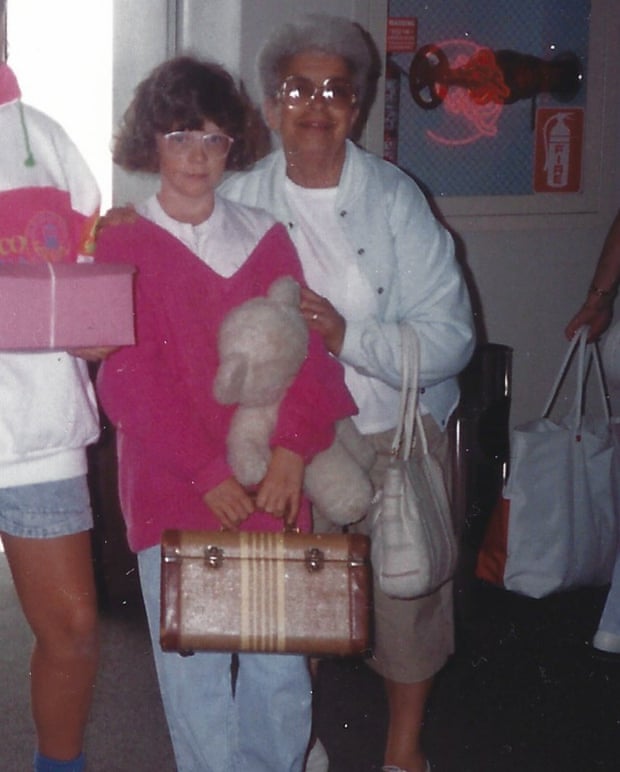
When I was a child, we lived in a 1980s mock-Tudor house in a working-class town in Connecticut. Already in my family there were signs of financial peril: my parents had divorced years earlier, and my mother struggled as a single parent of three. She had borrowed money from friends, and when repayment wasn’t possibile, one couple came to our home with a removal van to collect anything of value. They took furniture, the TV, the lawnmower and even my collection of dolls. The corner store my mother managed had collapsed, and around the house we had jumbo rubbish bags filled with the shop’s contents. For meals, my siblings and I would pick through the bags for dented boxes of cereal and chocolate bars in crinkly wrappers, as if we were in an apocalyptic movie. Outside, the unmown grass grew taller than knee height.
But still, we had the house. Or so we thought.
We found out it wasn’t so one evening in August, when my siblings and I returned from a two-week trip to California to visit our great-aunt. My older sister, 12 at the time, had chaperoned us through our connecting flights.
We arrived back at the airport overtired, full of stories about the stopover at O’Hare, during which we saw another unaccompanied child – a king among children – eat not one but two personal-sized pizzas because his family had given him a crisp $20 to spend. During the flight, we had rotated among our laps a pink box that held a Blum’s coffee crunch cake, a treat my mother had requested we bring back for her in memory of a childhood trip of her own.
We got into the back seat of the car, the cake box on my lap damp with handprints, streetlights flickering over it, as we sped down the freeway. Then my mother looked up into the rearview mirror and told us we wouldn’t be going home.
Our home wasn’t ours any more – she had planned for us to be away while she arranged a foreclosure. Our belongings had been put into storage and my cat stowed at my grandmother’s apartment, and we were living in an emergency shelter for homeless families. We settled for the night on beds that were covered with rubber sheets to protect the mattresses from urine. One of my siblings cried and wanted to go home. I felt the same way, although I don’t think I cried because I was too angry. I focused my anger on the cake, which couldn’t talk back and therefore seemed more capable of introspection and remorse than some adults of my acquaintance.
We stayed at the emergency shelter through the autumn and into December. I started the year in a new school, and tried to make friends without telling anyone what was actually happening in my life, and deal with our new financial limitations. When my shoes broke, I bought a pair of white canvas trainers for 99 cents from a craft store, but when my toes broke through that pair too, I just gave up and accepted that I was the kid with holey shoes.
Throughout the school day, and during the nights in the emergency shelter, I thought about our house. To my young mind, it was the solution to our predicament and not the symptom of it. Life there would mean a return to normality, never mind that normal had been knee-high grass and Kraft macaroni & cheese from the rubbish-bag buffet. I desired the appearance of respectability and stability without having any expectation that what went on inside would be respectable or stable, and I didn’t care, because to be in my own room with a library book and a door that closed on the chaos outside was enough for me.
I never returned to my home. It was no longer mine. New families bought and sold it, and other children staked their claims to the sledding hill and the bushes that glittered with blackberries on humid July days.
My house was no Manderley, and yet still sometimes I go there in my dreams. Down the hill and past the tyre swing in the tall oak tree. Past the spigot that I put my mouth to after eating a hot pepper from the garden. Through the kitchen, which caused my parents to disagree even years after their divorce about whether the sink had a garbage disposal. (It did not.) And up the stairs to my room and a window looking out over a red Japanese maple tree.
An elderly relative, who was born in Northern Ireland, once said that she never wanted to return to her childhood home, which had been the place of many happy memories and a family she loved. She didn’t want to see the changes that would have rendered it unfamiliar. In her mind, she could always walk the stone floors, which would never be covered with carpet, and if she had an apple tree in her back garden, it would remain there always.
As an adult, I understand how a certain sort of passionate sentimentality for a place can feel obliterating. Even if my house were on the market again, and I could visit, undercover, as a prospective buyer, I would choose not to, though for different reasons to those of my elderly relative.
It was a place where I was happy, until I wasn’t, and then I had to learn to let it go.
Housebreaking, by Colleen Hubbard, £16.99, is published by Corsair.



